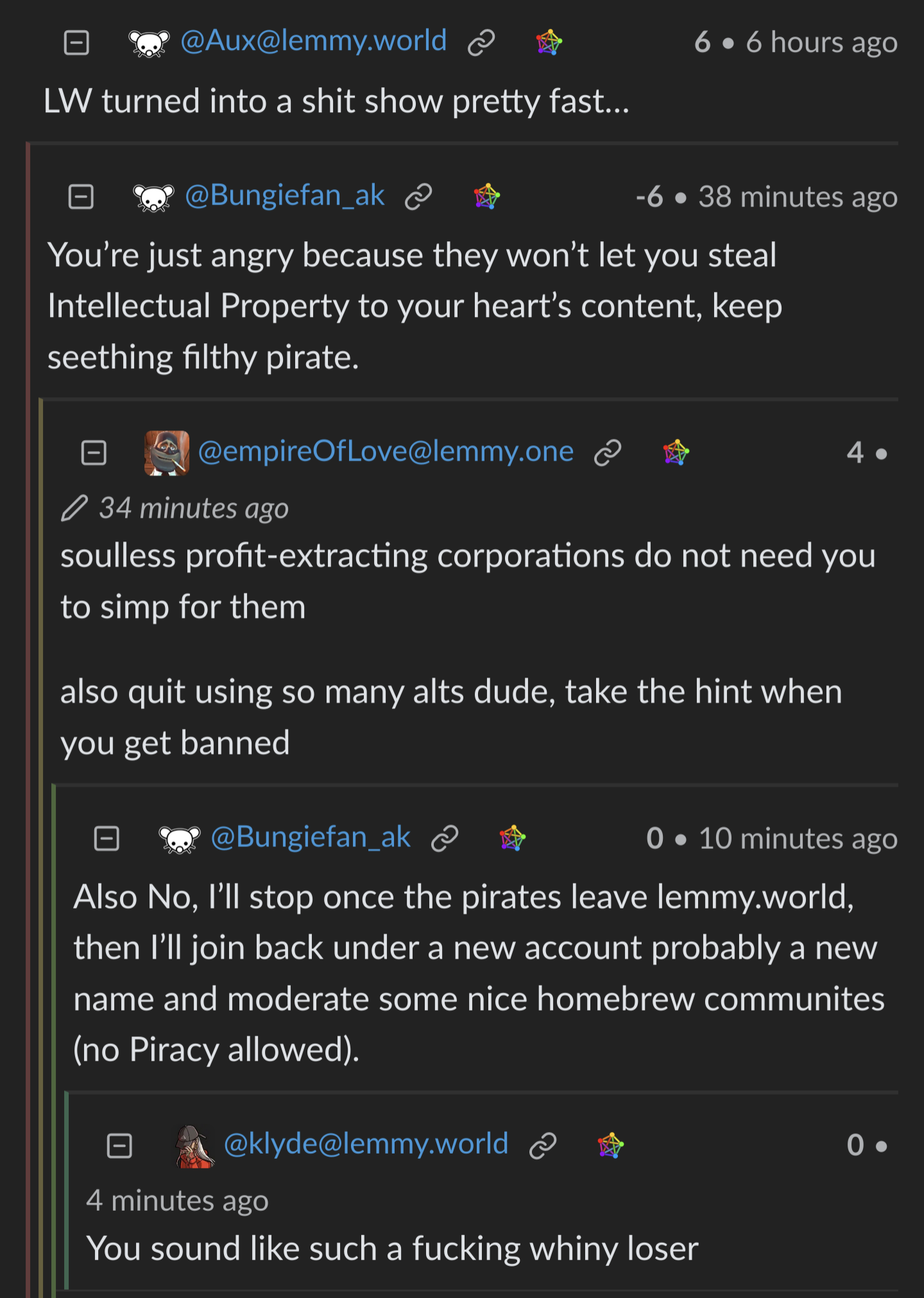this post was submitted on 15 Aug 2023
1170 points (94.6% liked)
Piracy: ꜱᴀɪʟ ᴛʜᴇ ʜɪɢʜ ꜱᴇᴀꜱ
55303 readers
660 users here now
⚓ Dedicated to the discussion of digital piracy, including ethical problems and legal advancements.
Rules • Full Version
1. Posts must be related to the discussion of digital piracy
2. Don't request invites, trade, sell, or self-promote
3. Don't request or link to specific pirated titles, including DMs
4. Don't submit low-quality posts, be entitled, or harass others
Loot, Pillage, & Plunder
📜 c/Piracy Wiki (Community Edition):
💰 Please help cover server costs.
 |
 |
|---|---|
| Ko-fi | Liberapay |
founded 2 years ago
MODERATORS
you are viewing a single comment's thread
view the rest of the comments
view the rest of the comments


It's funny, I've never met anybody who'd have that kind of experience and use the word "hacker" in this meaning simultaneously.
This checks out.
I remember exactly the opposite, people being much more acutely aware of the difference, and Stallman being much more popular than now.
Clarification? Movies about Steve Jobs excluded.
I'm slightly too young to use "hacker" the traditional old-MIT way. Maybe only by 2-3 years. I was a stupid kid playing with linux in the mid-90's and I hacked into a stupid municipal dialup BBS and got root, then neither did nor changed anything because it was "cool" to prove I could figure it out. Then "Hackers" came out and I ran that movie on repeat for a few weeks and then moved on to actually learning to code.
There's those of us who were avoiding Redhat for shittier distros (like Slackware back then imo) because we didn't want to buy anyone else's beer for us to contribute for free. Maybe we were fewer than it seemed. I was that ugy giving out Ubuntu Warty CD's having this weird pipe-dream of the tech world all going free-as-in-beer (yeah, I know they're a for-profit. A lot of people didn't get that back then and just saw a better Debian). Maybe again it relates to the exact date?
Mr. Gates started back when "hacker" didn't mean "hacker" (as you point out). He would pick up freely-given tech early on, and was then one of the first to start crying IP complaints and asserting his ownership of his product. Wherever you stand on the opinion, Gates' Open Letter to Hobbyists started his really terrible reputation, since many hobbyests accurately alleged he built his business on tech they were using/granting for free. I never knew the facts of the 1977 BASIC case where he was sued over ownership of BASIC and won, but then in the 80's he notoriously started his attitude of embrace, extend, extinguish. Everything from his behavior related to DOS, his ripping off Lotus Notes, etc. One could simply say "he was a good businessman" and they're allowed to feel that way. If you say "hey, you can have as much of my water as you want for free" and I drain your lake so you have to buy water back from me, technically what I'm doing is legal. That's basically what many people felt Gates did.
EDIT: And I don't have good references, but I remember some quotes from him as his reputation got bad, that the hobbyists shouldn't have been giving software out for free anyway. That the real problem was that they should have been demanding money for their work and/or keeping their ownership. One could argue his behavior was some of what spearheaded the carefully-crafted OSS licensing in the 80's.
It is unspeakably bizarre to me that people who know how to turn on a computer forgot that Gates is Satan's personal programmer at some point during the 21st century. I take it as an article of faith and my younger Millennial and Zoomer friends think I'm bullying a nice old man.